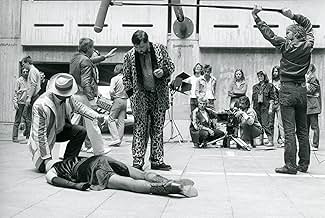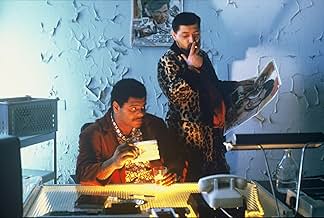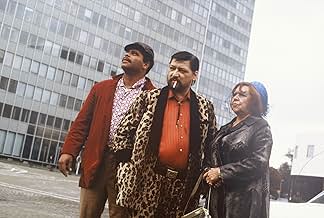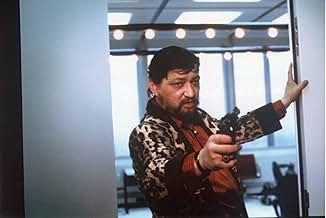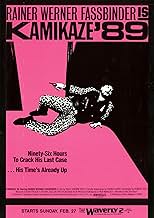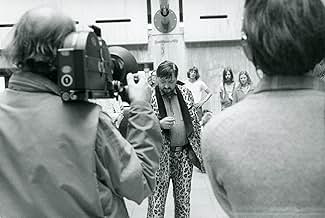Agrega una trama en tu idiomaIn a totalitarian society of the future, in which the government controls all facets of the press, a homicide detective investigates a string of bombings, and finds out more than he bargaine... Leer todoIn a totalitarian society of the future, in which the government controls all facets of the press, a homicide detective investigates a string of bombings, and finds out more than he bargained for.In a totalitarian society of the future, in which the government controls all facets of the press, a homicide detective investigates a string of bombings, and finds out more than he bargained for.
- Premios
- 1 premio ganado y 3 nominaciones en total
Andreas Mannkopff
- Wechselschichtregisseur
- (as Andreas Mannkopf)
Ute Koska
- Polizeiärztin
- (as Ute Fitz-Koska)
Hans-Eckart Eckhardt
- Polizist
- (as Hans-Eckhardt Eckhardt)
- Dirección
- Guionistas
- Todo el elenco y el equipo
- Producción, taquilla y más en IMDbPro
Argumento
¿Sabías que…?
- TriviaThis was the final acting role for Rainer Werner Fassbinder.
- ErroresThe movie claims 27 September 1989 to be a Monday, but that day was a Wednesday (The movie plays in 1989, as the title and a spoken intro make clear. The supposed explosion in the beginning of the movie was planned to take place on September 23, as Jansen points out. The chief of the police then urges Jansen to solve the case within for days, saying "until Monday afternoon," which would be September 27).
- Citas
Policewoman: Suicide
Polizeileutnant Jansen: It would be the first in four years.
Policewoman: Sorry, I meant 'premature death.
- ConexionesFeatured in Fassbinder (2015)
Opinión destacada
Wolf Gremm's "Kamikaze 1989" portrays a Germany that is rich, in which all problems are solved, where there is no pollution of the environment, where people work in sterile dust-free rooms with artificial light and air-conditioning, where alcohol is forbidden, since it causes incalculable reactions, where private persons are not allowed to grow vegetables on their own, since seeds may be contaminated, where there are, finally, no suicides anymore, but just cases of "unexpected death". The whole industry is in the hand of one gigantic concern, and all of its leading crew are family members. Competition is excluded, since creativity is dangerous. Even the handful of intellectuals who are working in the "cultural" department of the concern, have just to confirm the "intellectual" doctrine of the concern. Thus, the totalitarian company represents the good, because what is good is always associated with might (cf. the definition of the "axis of evil"). And since everything seems to be under control, the position of the evil is empty. However, strictly speaking, good cannot exist without evil and vice versa, because these ethic terms define one another logically. However, the position of evil is empty only until the company gets a bomb threat. It seems that the "spirit of evil", Krysmopompas, whose members once belonged to the "prokos", the intellectuals that used to work in the hidden 31st floor of the building, are behind the threat.
Police lieutenant Jansen, unforgettably played by Rainer Werner Fassbinder in his last role, is charged with the investigation, during which the open position of Krysmopompas is offered to him several times, but he refuses to take it over. Since the concern represents the good, the police must represent the evil. Even the police president is in the hand of the concern and looks like a caricature of Dr. Mabuse turned himself into a puppet. Possibly Jansen realizes that becoming Krysmopompas and thus fulfilling the vacuum of evilness would just consolidate the omnipotent concern, because it needs the evil to define itself as the good. Consequently, the director of the concern offers him a job, which Jansen also refuses. Therefore, Jansen takes a third position in a world in which there are only two, and this is presumably the reason why the movie is called "Kamikaze". However the title may be meant, this movie offers a highly complicated situation in which the categories of ethics are perverted. The typical 80ies' German TV-style of this movie should not make the audience blind that in portraying paradoxical ethical categories in a world in which metaphysics has been shoveled out like the alcohol, the seeds and suicide, "Kamikaze" goes way beyond thematically related movies like Godard's "Alphaville", Kubrik's "Dr. Strangelove" and even Tarkovsky's "Solyaris". A few years before "Kamikaze 1989", Fassbinder himself had directed the science-fiction movie "Welt am Draht" ("World on wire") which many people believe to have surpassed "Solyaris". In the final scene of Kamikaze, Fassbinder says his ultimate goodbye to his audience grinning in front of a picture of Armstrong's moon landing.
Police lieutenant Jansen, unforgettably played by Rainer Werner Fassbinder in his last role, is charged with the investigation, during which the open position of Krysmopompas is offered to him several times, but he refuses to take it over. Since the concern represents the good, the police must represent the evil. Even the police president is in the hand of the concern and looks like a caricature of Dr. Mabuse turned himself into a puppet. Possibly Jansen realizes that becoming Krysmopompas and thus fulfilling the vacuum of evilness would just consolidate the omnipotent concern, because it needs the evil to define itself as the good. Consequently, the director of the concern offers him a job, which Jansen also refuses. Therefore, Jansen takes a third position in a world in which there are only two, and this is presumably the reason why the movie is called "Kamikaze". However the title may be meant, this movie offers a highly complicated situation in which the categories of ethics are perverted. The typical 80ies' German TV-style of this movie should not make the audience blind that in portraying paradoxical ethical categories in a world in which metaphysics has been shoveled out like the alcohol, the seeds and suicide, "Kamikaze" goes way beyond thematically related movies like Godard's "Alphaville", Kubrik's "Dr. Strangelove" and even Tarkovsky's "Solyaris". A few years before "Kamikaze 1989", Fassbinder himself had directed the science-fiction movie "Welt am Draht" ("World on wire") which many people believe to have surpassed "Solyaris". In the final scene of Kamikaze, Fassbinder says his ultimate goodbye to his audience grinning in front of a picture of Armstrong's moon landing.
- hasosch
- 7 oct 2008
- Enlace permanente
Selecciones populares
Inicia sesión para calificar y agrega a la lista de videos para obtener recomendaciones personalizadas
- How long is Kamikaze 89?Con tecnología de Alexa
Detalles
Taquilla
- Total en EE. UU. y Canadá
- USD 22,440
- Fin de semana de estreno en EE. UU. y Canadá
- USD 5,613
- 5 jun 2016
- Total a nivel mundial
- USD 22,440
Contribuir a esta página
Sugiere una edición o agrega el contenido que falta

Principales brechas de datos
By what name was Kamikaze 1989 (1982) officially released in India in English?
Responda

